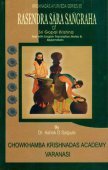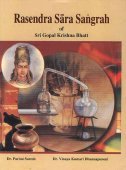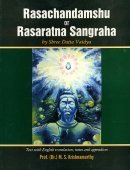Unmada, Unmāda, Unmadā: 30 definitions
Introduction:
Unmada means something in Buddhism, Pali, Hinduism, Sanskrit, the history of ancient India, Marathi, Hindi. If you want to know the exact meaning, history, etymology or English translation of this term then check out the descriptions on this page. Add your comment or reference to a book if you want to contribute to this summary article.
In Hinduism
Natyashastra (theatrics and dramaturgy)
Source: Wisdom Library: Nāṭya-śāstra1) Unmāda (उन्माद, “insanity”).—One of the thirty-three vyabhicāribhāva (transitory states), according to the Nāṭyaśāstra chapter 7. These ‘transitory states’ accompany the ‘permanent state’ in co-operation. The term is used throughout nāṭyaśāstra literature. (Also see the Daśarūpa 4.8-9)
2) Unmāda (उन्माद, “insanity”) refers to the seventh of the ten stages of love (kāma) arising in a woman (strī) and men (puṃs) alike, according to the Nāṭyaśāstra chapter 24.
Source: archive.org: Natya Shastra1) Unmāda (उन्माद, “insanity”) is caused by determinants (vibhāva) such as death of beloved persons, loss of wealth, stroke of adversity, derangement of [the three humours]: wind (vāta), biles (pitta), phelgm (śleṣmā), and the like. It is to be represented on the stage by laughing, weeping, crying, talking, lying down, sitting, running, dancing, singing and reciting [something] without any reason, smearing [the body] with ashes and dust, taking grass, Nirmālya. soiled cloth, tags, potsherd and earthen tray as decoration [of the body], many other senseless acts, and imitation of others.
2) Unmāda (उन्माद).—One of the ten stages of love (kāma);—When a woman introduces topic about him (i.e. the beloved) on all occasions and hates all other males, it is a case of Insanity (unmāda). To represent Insanity one should sometime look with a steadfast gaze, sometimes heave a deep sigh, sometimes be absorbed within oneself and sometimes weep at the usual time for recreation.

Natyashastra (नाट्यशास्त्र, nāṭyaśāstra) refers to both the ancient Indian tradition (shastra) of performing arts, (natya—theatrics, drama, dance, music), as well as the name of a Sanskrit work dealing with these subjects. It also teaches the rules for composing Dramatic plays (nataka), construction and performance of Theater, and Poetic works (kavya).
Purana and Itihasa (epic history)
Source: archive.org: Puranic EncyclopediaUnmadā (उन्मदा).—A celestial woman. Became a woman by the curse of Uravaśī. Haṃsa, the King of Gandharvas (semi-gods) had a general of the army called Durmada. He was a dangler. He had an eye on Urvaśī. She was the wife of Purūravas a famous King. On several occasions Durmada followed Urvaśī, with lustful desire. He had expressed his amour for her on several occasions. But Urvaśī did not pay any heed to his words. (See full article at Story of Unmadā from the Puranic encyclopaedia by Vettam Mani)
Source: Cologne Digital Sanskrit Dictionaries: The Purana Index1a) Unmāda (उन्माद).—A son of Nārāyaṇa and Śrī. Father of Saṃśaya.*
- * Brahmāṇḍa-purāṇa II. 11. 3.
1b) A group of evil spirits;1 a class of daityas.2
Source: JatLand: List of Mahabharata people and placesUnmāda (उन्माद) is a name mentioned in the Mahābhārata (cf. IX.44.27, IX.44.47) and represents one of the many proper names used for people and places. Note: The Mahābhārata (mentioning Unmāda) is a Sanskrit epic poem consisting of 100,000 ślokas (metrical verses) and is over 2000 years old.

The Purana (पुराण, purāṇas) refers to Sanskrit literature preserving ancient India’s vast cultural history, including historical legends, religious ceremonies, various arts and sciences. The eighteen mahapuranas total over 400,000 shlokas (metrical couplets) and date to at least several centuries BCE.
Ayurveda (science of life)
Kalpa (Formulas, Drug prescriptions and other Medicinal preparations)
Source: Shodhganga: Edition translation and critical study of yogasarasamgrahaUnmāda (उन्माद) refers to “insanity” and is one of the various diseases mentioned in the 15th-century Yogasārasaṅgraha (Yogasara-saṅgraha) by Vāsudeva: an unpublished Keralite work representing an Ayurvedic compendium of medicinal recipes. The Yogasārasaṃgraha [mentioning unmāda] deals with entire recipes in the route of administration, and thus deals with the knowledge of pharmacy (bhaiṣajya-kalpanā) which is a branch of pharmacology (dravyaguṇa).
Rasashastra (Alchemy and Herbo-Mineral preparations)
Source: Wisdom Library: Rasa-śāstraUnmāda (उन्माद) refers to “insanity” according to the fifth volume of the Rasajalanidhi (chapter 25). Accordingly, “an abnormal excess of the three doshas make their way upwards through improper channels (causing an obstruction of the sense-carrying passages), resulting in the unsoundness of the mind. This is a mental disease, and is called insanity (unmada). In its primary and undeveloped stage, it is called mada (distraction)”.
Insanity (unmada) is of eight different kinds, according as it is due to an abnormal excess of (1) vayu, (2) pitta, (3) kapha, (4) a combination of these three, and to (5) mental agony, (6) poison, (7) influence of evil spirits, and (8) intense sexual desire.
Unclassified Ayurveda definitions
Source: archive.org: Vagbhata’s Ashtanga Hridaya Samhita (first 5 chapters)Unmāda (उन्माद) refers to “frenzy”, as mentioned in verse 5.37-39 of the Aṣṭāṅgahṛdayasaṃhitā (Sūtrasthāna) by Vāgbhaṭa.—Accordingly, “[...] [ghee is] recommended for [...] (and) those exhausted from pulmonary rupture, pulmonary consumption, erysipelas, scalpel, and fire; dispersive of wind, choler, poison, frenzy [viz., unmāda-apaha], desiccation, unbeautifulness, and fever, [...]: ghee [viz., ghṛta] (is) possessed of a thousand powers (and), by its (many) ways of application, productive of a thousand effects”.
Source: archive.org: Science And Technology In Medievel India (Ayurveda)Unmāda (उन्माद) refers to “mania” or “insanity” and is one of the various diseases dealt with in the Dhanvantarīyapathyāpathya, as is mentioned in A. Rahman’s Science and Technology in Medievel India: A bibliography of source materials in Sanskrit, Arabic and Persian.—Ancient and medieval India produced a wide range of scientific manuscripts and major contributions lie in the field of medicine, astronomy and mathematics, besides covering encyclopedic glossaries and technical dictionaries.—The Dhanvantarīyapathyāpathya deals with the treatment of various diseases [e.g., Unmāda]. The word pathyāpathya classifies those elements as either beneficial or hurtful in disease.
Source: Research Gate: Internal applications of Vatsanabha (Aconitum ferox wall)Unmāda (उन्माद) refers to “psychosis”. Medicinal formulations in the management of this condition include 9 references of Vatsanābha usages. Guṭikā is maximum (7) dosage form in the management of Unmāda. Vatsanābha (Aconitum ferox), although categorized as sthāvara-viṣa (vegetable poisons), has been extensively used in ayurvedic pharmacopoeia.
Source: Indian Journal of History of Science: Jvaranirnaya: a rare monograph on diagnosis of fevers from the pre-colonial eraUnmāda (उन्माद) refers to “psychosis”, according to the Jvaranirṇaya: an Ayurvedic manuscript dealing exclusively with types of jvara (fevers) written by Sri Nārāyaṇa Paṇḍita in the 16th century CE.—The description of types of pacifications (upaśaya) is explained with examples. [...] Upaśaya is explained with the details of medicines (bheṣaja), diet (āhāra) and lifestyle modification (vihāra). These are explained with examples of diseases like rhinitis, diarrhoea, fever due to pitta predominance, psychosis (unmāda), fever due to Kapha predominance, burns, rheumatic type of fever, fever with predominance of coldness.

Āyurveda (आयुर्वेद, ayurveda) is a branch of Indian science dealing with medicine, herbalism, taxology, anatomy, surgery, alchemy and related topics. Traditional practice of Āyurveda in ancient India dates back to at least the first millenium BC. Literature is commonly written in Sanskrit using various poetic metres.
Shaivism (Shaiva philosophy)
Source: SOAS University of London: Protective Rites in the Netra TantraUnmāda (उन्माद) refers to a “group of supernatural beings” that cause illness, according to the Netratantra of Kṣemarāja: a Śaiva text from the 9th century in which Śiva (Bhairava) teaches Pārvatī topics such as metaphysics, cosmology, and soteriology.—The Netratantra’s Second Chapter begins with the goddess Pārvatī’s request that Śiva reveal to her the remedy for the ailments that afflict divine and worldly beings. [...]. Śiva adds to the list of maladies a group of supernatural beings that cause illness: [e.g., Unmādas], [...]. That Śiva discusses supernatural beings that cause such disease demonstrates how invisible forces affect the world in observable ways. In order to counter these forces, Śiva reveals another invisible but observable element, mantra.

Shaiva (शैव, śaiva) or Shaivism (śaivism) represents a tradition of Hinduism worshiping Shiva as the supreme being. Closely related to Shaktism, Shaiva literature includes a range of scriptures, including Tantras, while the root of this tradition may be traced back to the ancient Vedas.
In Buddhism
Tibetan Buddhism (Vajrayana or tantric Buddhism)
Source: Wisdom Library: Tibetan BuddhismUnmāda (उन्माद) is the name of a Kinnara mentioned as attending the teachings in the 6th century Mañjuśrīmūlakalpa: one of the largest Kriyā Tantras devoted to Mañjuśrī (the Bodhisattva of wisdom) representing an encyclopedia of knowledge primarily concerned with ritualistic elements in Buddhism. The teachings in this text originate from Mañjuśrī and were taught to and by Buddha Śākyamuni in the presence of a large audience (including Unmāda).

Tibetan Buddhism includes schools such as Nyingma, Kadampa, Kagyu and Gelug. Their primary canon of literature is divided in two broad categories: The Kangyur, which consists of Buddha’s words, and the Tengyur, which includes commentaries from various sources. Esotericism and tantra techniques (vajrayāna) are collected indepently.
Mahayana (major branch of Buddhism)
Source: De Gruyter: A Buddhist Ritual Manual on AgricultureUnmāda (उन्माद) refers to “insanity”, according to the Vajratuṇḍasamayakalparāja, an ancient Buddhist ritual manual on agriculture from the 5th-century (or earlier), containing various instructions for the Sangha to provide agriculture-related services to laypeople including rain-making, weather control and crop protection.—Accordingly, [as the Bhagavān teaches the offering of the root spell], “[...] After [the (pomegranate) branch] has been circled wrathfully 108 times, all neighbouring clouds and Nāgas with their retinues fall onto the ground. [...] If the spell-master recites the mantras swiftly, there will be family insanity (kula-unmāda) for all of them. They will perish along with their sons and grandsons, assemblies and vehicles. They will be destroyed. [...]”.

Mahayana (महायान, mahāyāna) is a major branch of Buddhism focusing on the path of a Bodhisattva (spiritual aspirants/ enlightened beings). Extant literature is vast and primarely composed in the Sanskrit language. There are many sūtras of which some of the earliest are the various Prajñāpāramitā sūtras.
India history and geography
Source: Academia: Ritual Period: A Comparative Study of Three Newar Buddhist Menarche ManualsUnmada (उन्मद) refers to “demons causing mental illness”, according to the “Vādhā byaṃ ke vidhi”: the name of two manuscripts written by (1) Kathmandu-based priest, Badriratna Bajracharya and (2) Buddharatna Bajracharya from Lalitpur.—Badriratna’s text pays the most attention to the invocations of celestial bodies and other cosmologically grouped agents. The list consists of [e.g., demons causing mental illness (unmadas)]. In this list, we particularly find the dark forces that are especially adept at causing problems for women, children and, more specifically, girl children, addressed and harnessed.

The history of India traces the identification of countries, villages, towns and other regions of India, as well as mythology, zoology, royal dynasties, rulers, tribes, local festivities and traditions and regional languages. Ancient India enjoyed religious freedom and encourages the path of Dharma, a concept common to Buddhism, Hinduism, and Jainism.
Languages of India and abroad
Marathi-English dictionary
Source: DDSA: The Molesworth Marathi and English Dictionaryunmāda (उन्माद).—m (S) Arrogance, haughtiness, extravagant conceit. 2 Intoxicating influence or power (of spirits, drugs, riches, honors).
Source: DDSA: The Aryabhusan school dictionary, Marathi-Englishunmāda (उन्माद).—m Arrogance, haughtiness, ex- travagant conceit. Intoxicating in- fluence.
Marathi is an Indo-European language having over 70 million native speakers people in (predominantly) Maharashtra India. Marathi, like many other Indo-Aryan languages, evolved from early forms of Prakrit, which itself is a subset of Sanskrit, one of the most ancient languages of the world.
Sanskrit dictionary
Source: DDSA: The practical Sanskrit-English dictionaryUnmada (उन्मद).—a.
1) Intoxicated, drunk; उदीरयामासुरिवोन्मदानाम् (udīrayāmāsurivonmadānām) R.2.9,16.54.
2) Mad, furious, extravagant; Śiśupālavadha 1. 4; उन्मदसारसारवः (unmadasārasāravaḥ) 12.44,77;16.59.
3) Causing intoxication, intoxicating; मधुकराङ्गनया मुहुरुन्मदध्वनिभृता निभृताक्षर- मुज्जगे (madhukarāṅganayā muhurunmadadhvanibhṛtā nibhṛtākṣara- mujjage) Śiśupālavadha 6.2.
-daḥ 1 Insanity.
2) Intoxication, ecstacy; कृतमनुकृतवत्य उन्मदान्धाः प्रकृतिमगन्किल यस्य गोपवध्वः (kṛtamanukṛtavatya unmadāndhāḥ prakṛtimagankila yasya gopavadhvaḥ) Bhāgavata 1.9.4.
--- OR ---
Unmāda (उन्माद).—a.
1) Mad, insane.
2) Extravagant.
-daḥ 1 Madness, insanity; अहो उन्मादः (aho unmādaḥ) Uttararāmacarita 3; Mālatīmādhava (Bombay) 9.
2) Intense passion, intoxication or extravagance of love; Mālatīmādhava (Bombay) 3,2.11; वीररभसोन्मादः (vīrarabhasonmādaḥ) Mv.2.22 rapturous joy.
3) Lunacy, mania (considered as a disease of the mind); मदयन्त्युद्धता दोषा यस्मादुन्मार्गमाश्रिताः । मानसोऽयमतो व्याधिरुन्माद इति कीर्तितः (madayantyuddhatā doṣā yasmādunmārgamāśritāḥ | mānaso'yamato vyādhirunmāda iti kīrtitaḥ) || Suśr.
4) (In Rhet.) Madness considered as one of the 33 subordinate feelings; चित्त- संमोह उन्मादः कामशोकभयादिभिः (citta- saṃmoha unmādaḥ kāmaśokabhayādibhiḥ) S. D.3; or according to R. G. विप्रलम्भमहापत्तिपरमानन्दादिजन्माऽन्यस्मिन्नन्यावभास उन्मादः (vipralambhamahāpattiparamānandādijanmā'nyasminnanyāvabhāsa unmādaḥ).
5) Bloom; उन्मादं वीक्ष्य पद्मानाम् (unmādaṃ vīkṣya padmānām) S. D.2.
6) A kind of पिशाच (piśāca); Bhāgavata 2.1.39.
Source: Cologne Digital Sanskrit Dictionaries: Edgerton Buddhist Hybrid Sanskrit DictionaryUnmada (उन्मद).—m., name of a demon that causes madness: Mahāvyutpatti 4760 = Tibetan smyo byed. Cf. Unmāda, in similar list of demons.
--- OR ---
Unmāda (उन्माद).—name of a class of demons (causing madness), = Unmada, which occurs in a similar list: Mahā-Māyūrī 219.9 etc.
Source: Cologne Digital Sanskrit Dictionaries: Shabda-Sagara Sanskrit-English DictionaryUnmada (उन्मद).—mfn.
(-daḥ-dā-daṃ) 1. Mad, furious, extravagant, intoxicated. m.
(-daḥ) Insanity, either morbid or as the effect of temporary excitement, intoxication, extacy. E. ut very, mad to be mad, ac aff.
--- OR ---
Unmāda (उन्माद).—mfn.
(-daḥ-dā-daṃ) Mad, insane, extravagant. m.
(-daḥ) 1. Madness, extravagance. 2. (In medicine,) Mania. E. ut much, mad to be mad, affix ghañ.
Source: Cologne Digital Sanskrit Dictionaries: Benfey Sanskrit-English DictionaryUnmada (उन्मद).—i. e. ud-mad + a. I. m. Ecstasy, insanity. Ii. adj., f. dā. 1. Drunk, [Prabodhacandrodaya, (ed. Brockhaus.)] 3, 12. 2. Thoughtless, [Pañcatantra] 176, 1. 3. Furious, [Devīmāhātmya, (ed. Poley.)] 4, 22
--- OR ---
Unmāda (उन्माद).—i. e. ud-mad + a, m. Madness, [Rāmāyaṇa] 5, 31, 40.
Source: Cologne Digital Sanskrit Dictionaries: Cappeller Sanskrit-English DictionaryUnmāda (उन्माद).—[adjective] mad, insane; [masculine] madness, insanity.
Source: Cologne Digital Sanskrit Dictionaries: Monier-Williams Sanskrit-English Dictionary1) Unmada (उन्मद):—[=un-mada] [from un-mad] mfn. mad, furious
2) [v.s. ...] extravagant
3) [v.s. ...] drunk, intoxicated, [Pañcatantra; Kathāsaritsāgara; Raghuvaṃśa; Prabodha-candrodaya] etc.
4) [v.s. ...] causing madness, intoxicating, [Śiśupāla-vadha vi, 20]
5) [v.s. ...] m. insanity, intoxication, [Horace H. Wilson]
6) Unmāda (उन्माद):—[=un-māda] [from un-mad] mfn. mad, insane, extravagant, [Bhāgavata-purāṇa]
7) [v.s. ...] m. insanity, madness
8) [v.s. ...] mania (as illness)
9) [v.s. ...] intoxication, [Mahābhārata; Suśruta; Sāhitya-darpaṇa etc.]
Source: Cologne Digital Sanskrit Dictionaries: Yates Sanskrit-English Dictionary1) Unmada (उन्मद):—[unma+da] (daḥ-dā-daṃ) a. Mad, intoxicated, furious. m. Madness.
2) Unmāda (उन्माद):—[unmā+da] (daḥ) 1. m. Madness. a. Mad.
Source: DDSA: Paia-sadda-mahannavo; a comprehensive Prakrit Hindi dictionary (S)Unmāda (उन्माद) in the Sanskrit language is related to the Prakrit words: Ummāya, Ommaya.
[Sanskrit to German]
Sanskrit, also spelled संस्कृतम् (saṃskṛtam), is an ancient language of India commonly seen as the grandmother of the Indo-European language family (even English!). Closely allied with Prakrit and Pali, Sanskrit is more exhaustive in both grammar and terms and has the most extensive collection of literature in the world, greatly surpassing its sister-languages Greek and Latin.
Hindi dictionary
Source: DDSA: A practical Hindi-English dictionary1) Unmada (उन्मद) [Also spelled unmad]:—(a) see [unmatta].
2) Unmāda (उन्माद) [Also spelled unmad]:—(nm) hysteria, insanity; lunacy; mania; intoxication; rabidity; frenzy, intense passion; hence ~[ka] (a); ~[grasta] (a); ~[na] (nm); [unmādī] insane; frenzied; hysterical.
...
Kannada-English dictionary
Source: Alar: Kannada-English corpusUnmada (ಉನ್ಮದ):—
1) [adjective] heavily drunk; highly intoxicated.
2) [adjective] highly arrogant; excited by the feeling of one’s pride.
--- OR ---
Unmada (ಉನ್ಮದ):—
1) [noun] the state or quality of being arrogant, overbearing or unduly domineering.
2) [noun] the state of the mind being excited or intoxicated.
--- OR ---
Unmāda (ಉನ್ಮಾದ):—
1) [noun] a psychoneurosis marked by emotional excitability and disturbances of psychic, sensory, vasomotor and visceral functions; hysteria.
2) [noun] (rhet.) madness considered as one of the thirty three minor sentiments.
3) [noun] a kind of a plant (uliga) .
Kannada is a Dravidian language (as opposed to the Indo-European language family) mainly spoken in the southwestern region of India.
See also (Relevant definitions)
Starts with (+4): Unmadabhanjana, Unmadacikitsapatala, Unmadagajakeshari, Unmadaittaa, Unmadaka, Unmadakari, Unmadalini, Unmadana, Unmadanabana, Unmadanatha, Unmadapaha, Unmadarna, Unmadashanti, Unmadavamta, Unmadavant, Unmadavasthe, Unmadavat, Unmadavayu, Unmadavibhrantavilapana, Unmadayanti.
Ends with: Anunmada, Bhutonmada, Kritonmada, Kulonmada, Mahadunmada, Mahonmada, Manonmada, Nirunmada, Smaronmada, Sonmada, Sunmada.
Full-text (+33): Unmadavat, Sonmada, Unmatam, Sunmada, Ummaya, Unmadin, Unmadavant, Mahonmada, Unmadishnu, Anunmada, Vyabhicaribhava, Unmad, Unmadanatha, Durmada, Ommaya, Pittonmatam, Cunmatam, Unmataki, Unmatti, Nirunmada.
Relevant text
Search found 35 books and stories containing Unmada, Unmāda, Unmadā, Un-mada, Un-māda; (plurals include: Unmadas, Unmādas, Unmadās, madas, mādas). You can also click to the full overview containing English textual excerpts. Below are direct links for the most relevant articles:
Bhakti-rasamrta-sindhu (by Śrīla Rūpa Gosvāmī)
Verse 2.4.80 < [Part 4 - Transient Ecstatic Disturbances (vyābhicāri-bhāva)]
Verse 3.4.71 < [Part 4 - Parenthood (vātsalya-rasa)]
Verse 2.4.84 < [Part 4 - Transient Ecstatic Disturbances (vyābhicāri-bhāva)]
Sahitya-kaumudi by Baladeva Vidyabhushana (by Gaurapada Dāsa)
Text 4.40 < [Chapter 4 - First-rate Poetry]
Text 7.54 < [Chapter 7 - Literary Faults]
Text 7.149 < [Chapter 7 - Literary Faults]
Jivanandana of Anandaraya Makhin (Study) (by G. D. Jayalakshmi)
Sannipātas (fevers due to Vāta, Pitta and Kapha) < [Chapter 4 - Āyurvedic principles in Jīvanandana Nāṭaka]
Act II (Summary) < [Chapter 3 - Summary of the Play Jīvānandana Nāṭaka]
Analysis of Vīra-rasa < [Chapter 6 - Dramatic aspects of the Jīvanandana Nāṭaka]
Puranic encyclopaedia (by Vettam Mani)
Garga Samhita (English) (by Danavir Goswami)
Verse 5.5.35 < [Chapter 5 - Śrī Kṛṣṇa’s Entrance Into Mathurā]
Verse 3.5.28 < [Chapter 5 - The Dispute Among the Gopas]
Verse 4.12.8 < [Chapter 12 - The Story of the Gopīs That In the Holi Festival Displayed Three Transcendental Virtues]
List of Mahabharata people and places (by Laxman Burdak)
Related products





